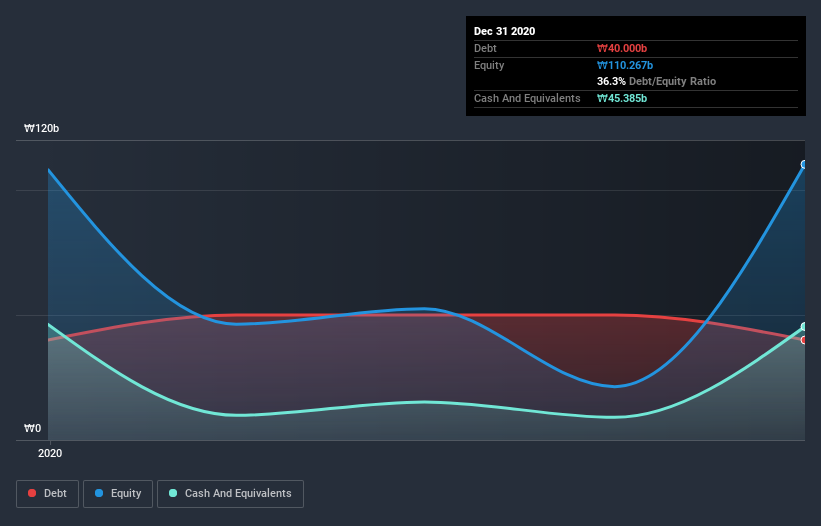
Some say volatility, rather than debt, is the best way to think about risk as an investor, but Warren Buffett famously said that 'Volatility is far from synonymous with risk.' So it seems the smart money knows that debt - which is usually involved in bankruptcies - is a very important factor, when you assess how risky a company is. Importantly, Air Busan Co., Ltd. (KRX:298690) does carry debt. But the more important question is: how much risk is that debt creating?
What Risk Does Debt Bring?
Debt and other liabilities become risky for a business when it cannot easily fulfill those obligations, either with free cash flow or by raising capital at an attractive price. Ultimately, if the company can't fulfill its legal obligations to repay debt, shareholders could walk away with nothing. However, a more usual (but still expensive) situation is where a company must dilute shareholders at a cheap share price simply to get debt under control. By replacing dilution, though, debt can be an extremely good tool for businesses that need capital to invest in growth at high rates of return. When we think about a company's use of debt, we first look at cash and debt together.
View our latest analysis for Air Busan
What Is Air Busan's Net Debt?
As you can see below, Air Busan had ₩40.0b of debt, at December 2020, which is about the same as the year before. You can click the chart for greater detail. But it also has ₩45.4b in cash to offset that, meaning it has ₩5.38b net cash.

A Look At Air Busan's Liabilities
We can see from the most recent balance sheet that Air Busan had liabilities of ₩288.5b falling due within a year, and liabilities of ₩635.7b due beyond that. Offsetting these obligations, it had cash of ₩45.4b as well as receivables valued at ₩19.9b due within 12 months. So its liabilities total ₩859.0b more than the combination of its cash and short-term receivables.
This deficit casts a shadow over the ₩303.3b company, like a colossus towering over mere mortals. So we definitely think shareholders need to watch this one closely. At the end of the day, Air Busan would probably need a major re-capitalization if its creditors were to demand repayment. Given that Air Busan has more cash than debt, we're pretty confident it can handle its debt, despite the fact that it has a lot of liabilities in total. There's no doubt that we learn most about debt from the balance sheet. But you can't view debt in total isolation; since Air Busan will need earnings to service that debt. So if you're keen to discover more about its earnings, it might be worth checking out this graph of its long term earnings trend.
Over 12 months, Air Busan made a loss at the EBIT level, and saw its revenue drop to ₩190b, which is a fall of 70%. That makes us nervous, to say the least.
So How Risky Is Air Busan?
By their very nature companies that are losing money are more risky than those with a long history of profitability. And in the last year Air Busan had an earnings before interest and tax (EBIT) loss, truth be told. And over the same period it saw negative free cash outflow of ₩139b and booked a ₩128b accounting loss. Given it only has net cash of ₩5.38b, the company may need to raise more capital if it doesn't reach break-even soon. Summing up, we're a little skeptical of this one, as it seems fairly risky in the absence of free cashflow. When analysing debt levels, the balance sheet is the obvious place to start. However, not all investment risk resides within the balance sheet - far from it. We've identified 3 warning signs with Air Busan (at least 2 which don't sit too well with us) , and understanding them should be part of your investment process.
If, after all that, you're more interested in a fast growing company with a rock-solid balance sheet, then check out our list of net cash growth stocks without delay.
When trading Air Busan or any other investment, use the platform considered by many to be the Professional's Gateway to the Worlds Market, Interactive Brokers. You get the lowest-cost* trading on stocks, options, futures, forex, bonds and funds worldwide from a single integrated account. Promoted
New: Manage All Your Stock Portfolios in One Place
We've created the ultimate portfolio companion for stock investors, and it's free.
• Connect an unlimited number of Portfolios and see your total in one currency
• Be alerted to new Warning Signs or Risks via email or mobile
• Track the Fair Value of your stocks
This article by Simply Wall St is general in nature. It does not constitute a recommendation to buy or sell any stock, and does not take account of your objectives, or your financial situation. We aim to bring you long-term focused analysis driven by fundamental data. Note that our analysis may not factor in the latest price-sensitive company announcements or qualitative material. Simply Wall St has no position in any stocks mentioned.
*Interactive Brokers Rated Lowest Cost Broker by StockBrokers.com Annual Online Review 2020
Have feedback on this article? Concerned about the content? Get in touch with us directly. Alternatively, email editorial-team (at) simplywallst.com.
About KOSE:A298690
Minimal with weak fundamentals.
Market Insights
Community Narratives




